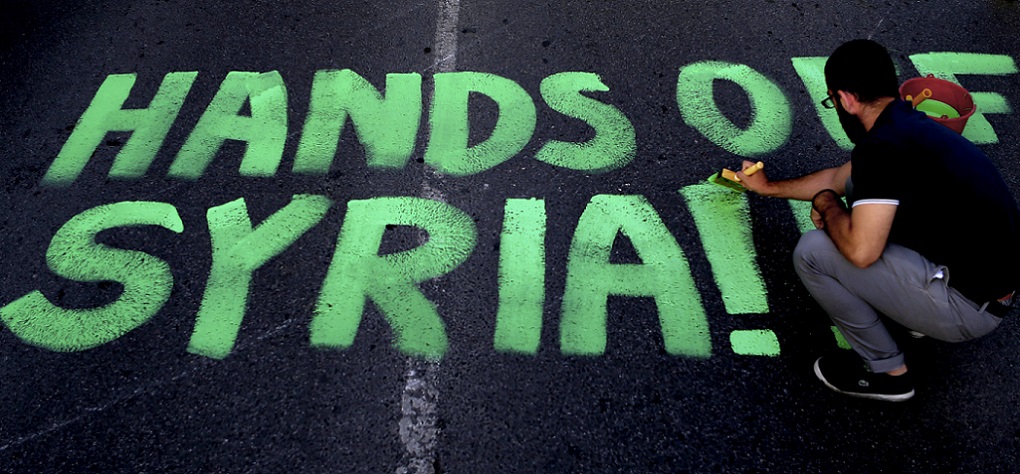Alwaght- On Monday, Lebanon’s Al-Watan newspaper, quoting Western diplomatic sources, reported that the Saudi Envoy to the United Nations Abdullah bin Yahya al-Mualimi has invited his Syrian counterpart Bashar Jaafari to attend a ceremony in which the Arab Kingdom will be handed over the presidency of the G20. The Lebanese newspaper reported that the Saudi diplomat surprised the Syrian diplomat with a warm meeting and called for friendly relations between Riyadh and Damascus. The Saudi envoy has reportedly called the deep division and high-level tensions between the two countries a “piece of passing cloud”, ignoring the Arab countries severing of diplomatic relations with Syria and suspending Damascus in the Arab League under the Saudi pressures.
This is not the first time Riyadh and its Arab allies send signals of willingness to repair the largely damaged relationship with Syria. In September 2018, the Bahraini foreign minister at a meeting of the UN warmly hugged the Syrian counterpart Walid Muallem. The experts called the move a sign of the openness of the Persian Gulf Arab states to the Syrian government after years of supporting the armed rebels and terrorist fighters against Damascus. Very soon, this message was translated into action as the UAE reopened its embassy in Damascus in December of the same year. Due to the closeness of the Saudi Crown Prince Mohammed bin Salman’s policies to those of Abu Dhabi Crown Prince Mohammed bin Zayed, the reopening of the UAE embassy gave the implication that Abu Dhabi can work as a mediator for indirect Saudi-Syrian contacts. So, the Monday move by the Saudi envoy should be read as a sequel to the Riyadh’s change of approach to the Syrian developments.
Despite the ostensible show of willingness by the Saudis for engaging in new friendly relations, the ground realities reveal the other side of the Saudi Syria approach. Over the past few weeks and mainly as the meetings of the Syria Constitution Committee started, Saudi Arabia held a meeting attended by the Syrian opposition leaders. The meeting focused on introducing changes to the committee and Riyadh managed to push aside figures close to Turkey from the board of presidency. The meeting drew strong criticism of Naser al-Hariri, the head of the Supreme Council of the Syrian Revolution. The media circles close to the Syrian opposition called the Riyadh-hosted meeting a Saudi coup against the Supreme Council.
Furthermore, Saudi Arabia began efforts to warm up to the Syrian Kurds to prevent their alliance to Damascus as the US President Donald Trump abruptly said he plans to pull the American forces out of Syria.
Thamer al-Sabhan, the Saudi state minister for regional affairs, along with the US Deputy Assistant Secretary of State for Home Affairs Joel M. Rubin, and former US ambassador to Bahrain William Robak in July last year crossed the border into Deir ez-Zor in Syria’s east and met with the Kurdish commanders and tribal leaders there. Also, the UAE has recently hosted Sipan Hamo, the commander of the Kurdish People’s Protection Units (YPG). Abu Dhabi has reportedly promised him financial and arms aids, vowing the UAE will back an autonomous Kurdish region in northern Syria. Add to these the Arab regimes’ attempts to normalize with the Israeli regime which runs counter to the Syrian interests.
How can this contradiction in Saudi behavior to Syria be analyzed?
Definitely, a major part of the Saudi show of tendency to improve the relationship with Damascus is motivated by an outlook of President Bashar al-Assad stay in power in the Syrian future, a reality yielded by the Syrian army and its allies’ victories against a host of terrorist groups backed by Arab and Western governments. The coincidence of the dismissal of the Saudi Foreign Minister Adel al-Jubeir who always insisted on President Assad’s ouster at the end of the road, with reopening of the Emirati embassy in Syria is not an accident.
Under its de facto ruler Prince Mohammed bib Salman, Saudi Arabia over the past few years started aggressive policies against the Axis of Resistance, led by Iran. The Saudi delusion was that Riyadh could turn the tide to its favor under American support. This way of thinking motivated aggression against Yemen, the support of terrorists in Syria, boosting ISIS along Iran's western and eastern border, and blockade of Qatar which showed signs it does not obey the Saudi policies.
Bin Salman’s policies had no outcome for the kingdom but huge costs. It was in the middle of the regional defeats that the prominent Saudi journalist Jamal Khashoggi was assassinated by a hit squad suspected to have been sent by Prince Mohammed. The assassination made him aware of his shaky ground for succession at home and abroad. He rushed to cover the threat to his position by increasing social freedoms.
The increase in Yemeni Ansarullah’s missile and drone strikes on sensitive Saudi facilities and sites sent a clear message from Iran to the Saudis about the secret games to deal blows to the Iranian interests. This pushed the Saudis to find a way out of Yemen war quagmire, starting with Muscat peace talks with Yemen. Now the Saudi diplomats’ meeting with the Syrian counterparts many believe is a symbolic message from Riyadh to Tehran. To be more precise, the defeat of the Saudi regional policies puts ahead of the Saudi king and the crown prince a need for some changes in review of the wrong policies of the past.



























